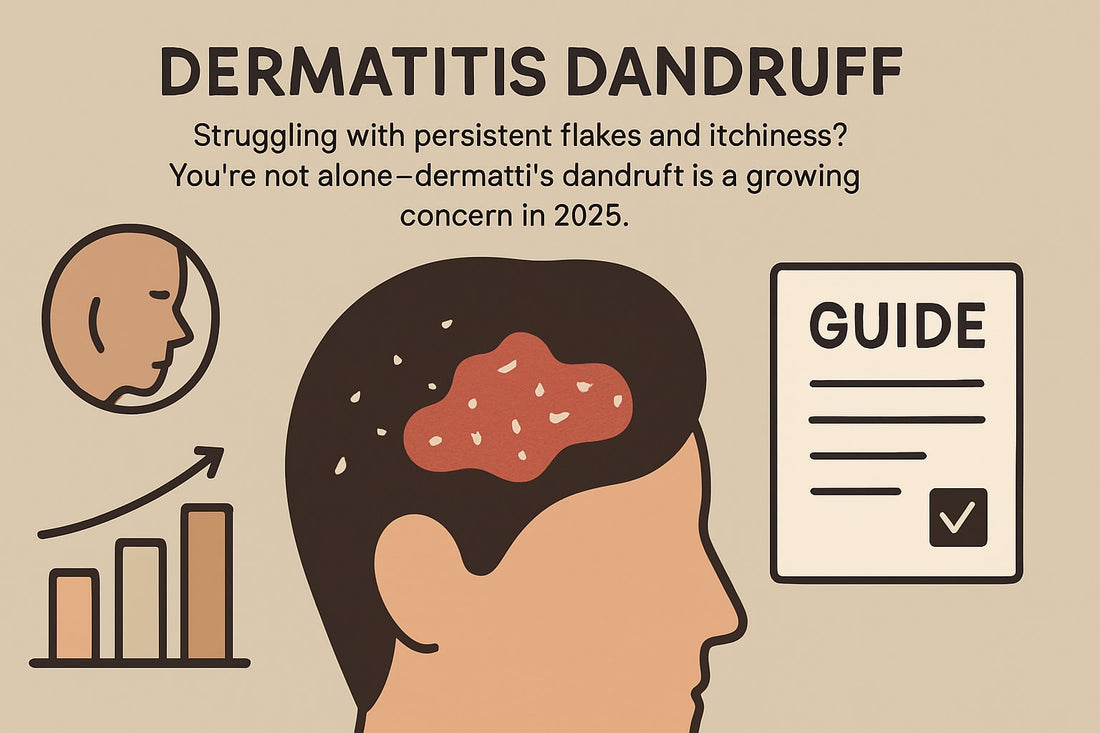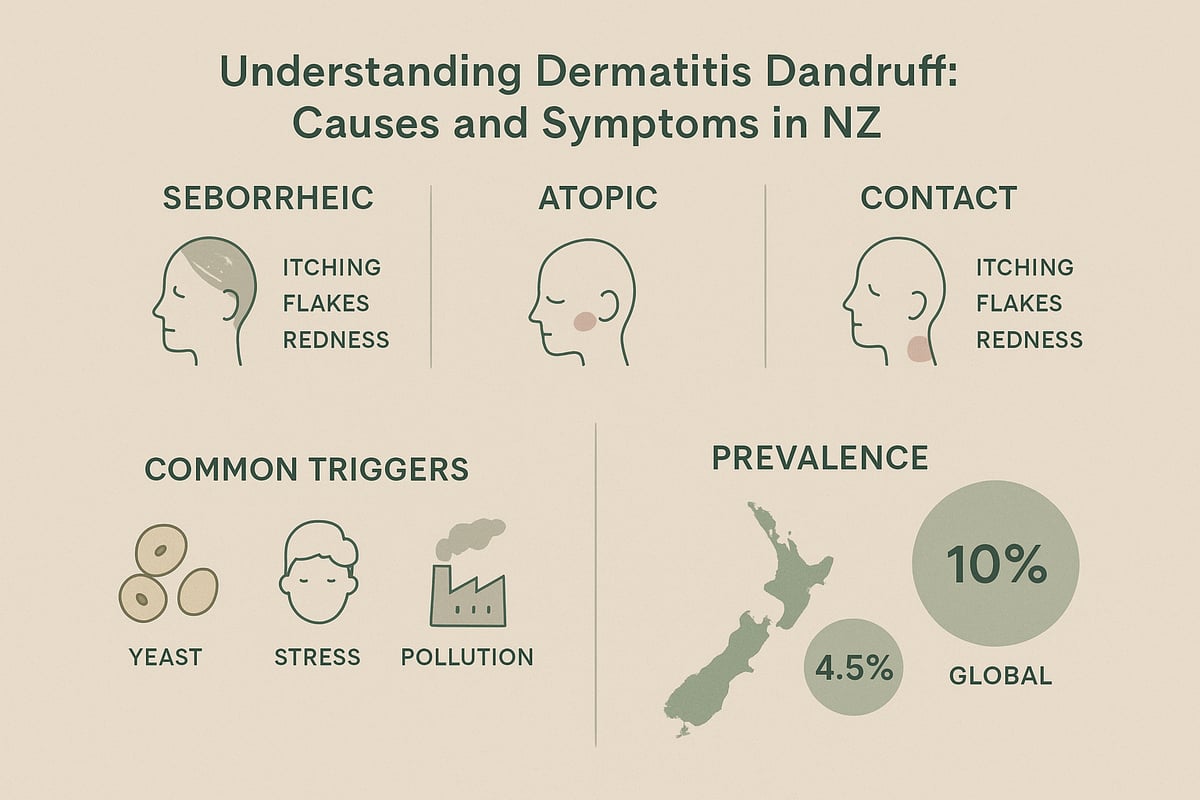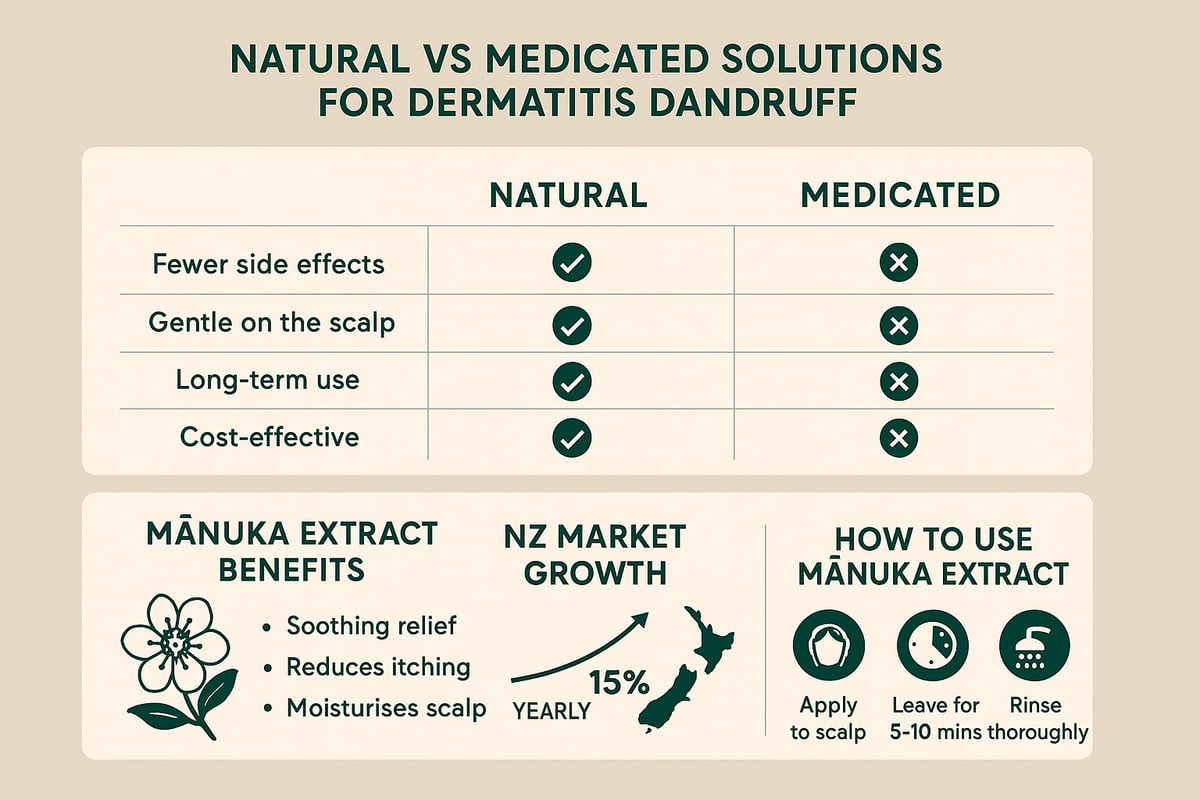
Dermatitis Dandruff Guide: Expert Solutions for 2025
Struggling with persistent flakes and itchiness? You are not alone, as dermatitis dandruff is becoming a widespread concern in 2025. This guide brings you the latest expert-backed solutions for managing dermatitis dandruff and restoring scalp comfort.
We aim to empower you with practical steps, innovative treatments, and natural remedies—like New Zealand’s own Mānuka extract—so you can achieve a healthier, flake-free scalp and skin.
Inside, you will discover the causes, symptoms, cutting-edge therapies, natural options, prevention strategies, and expert tips for lasting relief from dermatitis dandruff.
Understanding Dermatitis Dandruff: Causes and Symptoms
Dermatitis dandruff can feel like an endless cycle of flakes, redness, and frustration. Getting to the root of this condition is the first step to lasting relief. In this section, we break down what sets dermatitis dandruff apart, explore its core causes, and help you recognise when it is time to seek expert help.

What is Dermatitis Dandruff?
Dermatitis dandruff is more than simple dry scalp. It is an inflammatory skin condition that causes persistent flakes and discomfort. Unlike regular dandruff, which is usually mild and dry, dermatitis dandruff often involves irritated, red, or even greasy skin.
There are three main types:
- Seborrheic dermatitis: Commonly affects the scalp and face, linked to oil-producing glands.
- Atopic dermatitis: Often seen in those with eczema, involving itchy, inflamed skin.
- Contact dermatitis: Triggered by reactions to products or allergens.
Dermatitis dandruff affects people of all ages. In New Zealand, skin conditions like dermatitis are widespread and impact quality of life. Globally, millions experience these symptoms every year.
Key Causes and Triggers
Several factors can set off or worsen dermatitis dandruff. The main culprit is the overgrowth of Malassezia yeast, which thrives in oily areas and can irritate sensitive skin.
Other causes and triggers include:
- Genetic predisposition: Family history increases risk.
- Immune response: Overactive immune systems react strongly to normal skin flora.
- Environmental factors: Humidity, pollution, and stress can all play a role.
- Irritants: Harsh shampoos or certain hair products may trigger flare-ups.
To dive deeper into these causes and see effective management tips, visit Dandruff Causes and Solutions for expert insights.
Understanding these triggers can help you take control of dermatitis dandruff and reduce its impact on your daily life.
Recognising Symptoms and When to Seek Help
The main symptoms of dermatitis dandruff include:
- Persistent redness on the scalp or hairline
- Itching that does not resolve with regular washing
- Flaky, greasy, or thick scales
Some people notice symptoms only during certain seasons, while others struggle year-round. Chronic flare-ups may indicate a need for stronger intervention.
If your symptoms worsen, spread beyond the scalp, or become painful, it is wise to consult a dermatologist. Early help can prevent complications and support your journey to a healthier, flake-free scalp.
Latest Medical Treatments and Innovations for 2025
Keeping up with the latest medical advances is essential for anyone managing dermatitis dandruff. In 2025, both prescription and over-the-counter options have evolved, offering more effective and targeted relief than ever before. Let’s break down the most recent breakthroughs and what they mean for your scalp health.

Advances in Prescription Therapies
Prescription treatments for dermatitis dandruff are becoming more sophisticated in 2025. Dermatologists now have access to enhanced antifungal medications that specifically target the Malassezia yeast responsible for many flare-ups. New-generation corticosteroids are designed to reduce inflammation with fewer side effects, making long-term use safer for sensitive scalps.
Biologics, which harness the body’s immune system to control severe dermatitis dandruff, are also gaining traction for cases that don’t respond to traditional therapies. Recent clinical studies show improved success rates, especially for stubborn or widespread symptoms. However, potential side effects such as irritation or thinning skin remain, so close medical supervision is essential.
Over-the-Counter Solutions
Over-the-counter options for dermatitis dandruff have seen significant updates, especially in New Zealand pharmacies. Modern shampoos featuring zinc pyrithione, ketoconazole, and selenium sulfide now use refined formulas that are gentler on the scalp while maintaining effectiveness.
Comparing these OTC products with prescription treatments, many users experience relief from mild to moderate symptoms. Popular NZ pharmacy brands have adapted their lines to include sensitive options and natural additives, offering a broader choice for those seeking everyday scalp care. Always check for products that suit your skin type, and avoid harsh chemicals that can worsen irritation.
Comparison Table: OTC vs Prescription
| Feature | OTC Shampoos | Prescription Medications |
|---|---|---|
| Active Ingredients | Zinc pyrithione, ketoconazole | Advanced antifungals, corticosteroids |
| Best For | Mild to moderate symptoms | Severe or resistant cases |
| Accessibility | Easily available, affordable | Requires doctor's script |
Light Therapy and Emerging Technologies
Light-based therapies are emerging as promising alternatives for dermatitis dandruff, especially for those who struggle with topical treatments. UVB phototherapy and targeted LED light technology help reduce inflammation and slow down the rapid turnover of skin cells that leads to flaking.
Clinical trials in New Zealand report that these therapies can significantly decrease symptoms, with many patients experiencing improved comfort and appearance after just a few sessions. Safety is a top priority, with treatments tailored to individual needs and close monitoring to minimise risks like sunburn or pigment changes. Many NZ clinics now offer these services, making innovative scalp care more accessible.
Expert Recommendations for Combination Approaches
Dermatologists increasingly recommend a combination approach for managing dermatitis dandruff. This means blending topical treatments, oral medications, and lifestyle adjustments to achieve lasting results.
Tailoring your regimen to your unique triggers and symptoms is key. If you’re unsure where to start, or if you experience frequent flare-ups, consulting a dermatologist is highly recommended. For more in-depth advice on advanced treatment options, the Eczema and Dermatitis Management Guide offers valuable expert insights and step-by-step support.
Natural Remedies and the Power of Mānuka Extract
Are you searching for a kinder, more sustainable way to manage dermatitis dandruff? In 2025, more New Zealanders are reaching for natural solutions, seeking relief without harsh chemicals. The demand for gentle, eco-friendly care is booming as people grow wary of overusing medicated shampoos.
Recent studies show New Zealand’s natural product market is expanding rapidly, driven by concerns about long-term scalp health. Many now prefer botanical remedies that support the skin’s balance, aiming to reduce irritation and environmental impact. It’s clear that natural care isn’t just a trend, but a movement reshaping how we treat dermatitis dandruff.

Why Natural Solutions Matter in 2025
With so many people experiencing dermatitis dandruff, the move toward natural skincare is stronger than ever. Overuse of medicated shampoos can sometimes lead to dryness, resistance, or even sensitivity. Many find that natural remedies offer a gentler approach, supporting long-term scalp health without unwanted side effects.
In New Zealand, consumer research shows a sharp increase in demand for botanical-based scalp care. More shoppers read labels, looking for eco-friendly packaging and plant-powered ingredients. As dermatitis dandruff becomes more common, people want options that are both effective and nurturing, helping them feel confident and comfortable every day.
Science Behind Mānuka Extract for Dermatitis Dandruff
Mānuka extract, native to New Zealand, is earning global recognition for its ability to target dermatitis dandruff naturally. This unique extract is packed with antimicrobial and anti-inflammatory compounds that help calm redness, soothe itchiness, and reduce flaking.
Recent studies show that Mānuka extract can reduce scalp irritation and support the microbiome, making it a strong alternative to traditional medicated options. Compared to older remedies, it works with your skin’s natural defences, not against them. For more on the science behind its benefits, visit Manuka Extract Benefits Explained. With its proven track record, Mānuka is transforming how we care for dermatitis dandruff.
Waipu Extracts: Leading the Way with Mānuka Extract
When it comes to harnessing the full power of Mānuka for dermatitis dandruff, Waipu Extracts stands out as a true local innovator. Waipu Extracts uses a full-spectrum Mānuka extract, carefully obtained through a unique process that preserves the plant’s most valuable properties. This ensures every product delivers the maximum benefit for sensitive scalps.
Customers across New Zealand and beyond share stories of relief from persistent flakes and itching after switching to Waipu Extracts. The brand’s commitment to quality and sustainability has earned it global recognition, while its roots remain proudly Kiwi. Waipu Extracts proves that natural, effective care for dermatitis dandruff can start right here in New Zealand.
How to Incorporate Mānuka Extract into Your Routine
Ready to bring the benefits of Mānuka extract into your daily routine for dermatitis dandruff? Start by choosing a trusted product like Waipu Extracts BoostBlend, making sure it uses high-quality, full-spectrum extract. Cleanse your scalp gently, focusing on areas prone to flakes.
Apply your Mānuka treatment as directed, massaging gently for best absorption. Use two to three times a week, or as recommended. Keep your routine simple and consistent, and monitor your scalp’s response. With patience and the right approach, you can enjoy healthier, flake-free skin and lasting comfort.
Step-by-Step Guide: Managing Dermatitis Dandruff at Home
Managing dermatitis dandruff at home can feel overwhelming, but with a structured approach, relief is within reach. By breaking the process into clear, manageable steps, you can take control and soothe your scalp. Here’s how to build a personalised routine for lasting comfort.

Step 1: Assess and Identify Triggers
Begin by tracking your dermatitis dandruff symptoms in a diary. Record when flare-ups occur, weather changes, stress levels, and any new hair or skin products. In New Zealand, triggers often include high pollen counts, seasonal shifts, and even urban pollution.
Common environmental factors can aggravate dermatitis dandruff. For example, humid summers or sudden drops in temperature sometimes spark symptoms. If you notice a pattern, it becomes easier to avoid or manage these triggers. For more on how skin diseases vary across NZ, see the Prevalence of skin diseases in New Zealand.
Keep your diary handy and update it regularly. This empowers you to make informed changes for better scalp health.
Step 2: Choose the Right Cleansing Routine
Selecting a gentle, sulphate-free shampoo is essential for those with dermatitis dandruff. Harsh cleansers can strip away natural oils, leading to irritation and more flakes. Look for products designed for sensitive skin, and consider alternating between medicated and natural options.
Avoid overwashing, as this can disrupt your scalp’s balance. Two to three washes per week is often enough. If you use styling products, make sure they are free from alcohol and synthetic fragrances, which can worsen dermatitis dandruff.
Consistency is key. Stick to a routine and observe how your scalp responds over time.
Step 3: Apply Targeted Treatments
For effective management, combine topical antifungals, corticosteroids, and natural remedies like Waipu Extracts Mānuka extract. Gently massage treatments into the scalp to improve absorption and soothe irritation.
Waipu Extracts uses a unique Supercritical Fluid Extraction Process to preserve the full spectrum of active compounds. This method ensures you get the most potent, soothing benefits for dermatitis dandruff.
Regularly monitor your progress. If symptoms worsen or do not improve, consult a healthcare professional for tailored advice.
Step 4: Support Scalp Health with Lifestyle Changes
Lifestyle adjustments can make a big impact on dermatitis dandruff. Focus on stress reduction through mindfulness, gentle exercise, or hobbies. A balanced diet rich in omega-3s, probiotics, and adequate hydration supports skin health from within.
Protect your scalp from harsh weather by wearing hats during intense sun or cold snaps, especially in New Zealand’s variable climate. Indoor heating can also dry out the scalp, so use a humidifier if needed.
By nurturing your body and mind, you create the best environment for a flake-free, comfortable scalp.
Prevention Strategies and Long-Term Scalp Care
Taking a proactive approach to prevention is key for anyone affected by dermatitis dandruff. By building a thoughtful routine, adapting to the environment, and staying vigilant, you can keep your scalp calm and flake-free.
Building a Flake-Free Routine
Consistency is your best friend when it comes to managing dermatitis dandruff. Start with a gentle, sulphate-free shampoo and a lightweight moisturiser made for sensitive scalps. Avoid harsh ingredients like alcohol or strong fragrances, as these can trigger irritation.
- Wash your hair regularly, but do not overwash.
- Moisturise after cleansing to lock in hydration.
- Choose NZ brands known for sensitive formulas, such as Waipu Extracts, which uses full-spectrum Mānuka extract for natural relief.
Recent research on the global burden of seborrheic dermatitis highlights the importance of daily scalp care routines in reducing symptoms worldwide. Staying consistent helps minimise flare-ups and keeps your scalp barrier healthy.
Environmental and Seasonal Adjustments
New Zealand’s ever-changing climate can influence dermatitis dandruff. Dry winter air, summer humidity, and even pollen count all play a role in triggering symptoms. Adapt your care routine seasonally to stay ahead.
- In winter, use a humidifier indoors and wear a soft beanie to protect your scalp from cold winds.
- In summer, opt for a lightweight scarf or hat to shield from UV rays.
- Always rinse out sweat and saltwater after outdoor activities.
By making small changes as the seasons shift, you help your scalp maintain balance and comfort year-round.
When to Seek Professional Help
While home care is effective for most, some cases of dermatitis dandruff need a specialist’s touch. If you notice signs of infection, severe inflammation, or unresponsive symptoms, it is time to consult a dermatologist.
Dermatologists in New Zealand can provide advanced treatment options and personalised advice. According to the Epidemiology of skin infections in Auckland, timely intervention improves outcomes and prevents complications, especially in persistent or complex cases.
Accessing professional care ensures you receive the right diagnosis and a tailored treatment plan.
Expert Tips for Lasting Results
Long-term relief from dermatitis dandruff comes from ongoing attention and adaptation. Keep a symptom diary to track triggers and progress. Review new research or product updates regularly, especially natural innovations like Waipu Extracts’s Mānuka .
- Monitor your scalp for changes.
- Adjust your routine when seasons or stress levels shift.
- Stay informed about the latest expert recommendations.
Proactive care and a willingness to adapt will help you maintain a healthy, flake-free scalp for the long term.
We know how tough it can be to deal with stubborn flakes and irritation, especially when nothing seems to bring lasting relief. If you’re ready to try a science-backed, gentle approach that harnesses the natural power of Mānuka, you’re not alone. Plenty of Kiwis have found real results by switching to natural, full-spectrum Mānuka extract for their dermatitis dandruff. It’s a simple step you can add to your routine right now, and you might be surprised by the difference. If you’re curious to experience these benefits for yourself, Get Your Mānuka Extract Today.

